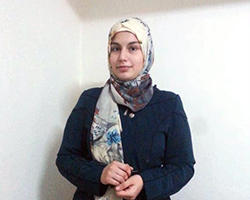Personal story – Community worker Sabiha Zekeriya brings health and hope to the doorsteps of Syrians in Turkey

WHO
Sabiha Zekeriya knows all too well that life can change in an instant. Just a decade ago, the future was looking bright for both her and her husband. She was a biology student at the University of Idlib, while he was a law graduate who followed his passion to teach art. When war erupted, their lives were turned upside down. Like so many other Syrians, the young couple fled to Turkey.
“When we first came to Turkey, we experienced a lot of financial hardship and could only afford to live in a squat house, far away from the city,” Sabiha explains. “I was constantly worried about the condition of our house because it was very dangerous and unhealthy for our newborn baby.”
One day, they were visited at home by a member of the Community Health Support Staff (CHSS) team. Sabiha, unaware that her life was about to change for the better, was both relieved and grateful for the visit.
During the health check, the team learned about Sabiha’s educational background, and it didn’t take long before she received an unexpected phone call. The Hatay Refugee Health Training Centre contacted her, asking whether she would like to receive some training and join the CHSS team, as her experience would be a valuable asset.
“I couldn’t have imagined how much that visit would change our lives,” Sabiha recalls. “Life was so hard. I tried to support my husband’s efforts to provide for us by making shoes at home. Our financial difficulties were unbearable. And then I got this fantastic opportunity.”
A new life
Today, Sabiha is 33 years old, a proud mother of 3 and a key member of the CHSS staff at the Hatay Refugee Health Training Centre. After attending training sessions provided by WHO experts at the Centre, she gained the necessary knowledge and skills to provide home-care services.
Sabiha remembers her first field visit with the team as the moment she realized the importance of home care. “I knew my own conditions were not ideal, but seeing all these people in their homes waiting desperately for help to come made me want to work even harder to help them,” she reflects.
Home care visits by psychologists, social workers, outreach workers and doctors, both Syrian and Turkish, play a crucial role in supporting Syrian refugees who would otherwise pass under the radar. Old age or disability leave many refugees stranded at home in precarious conditions, adding to their vulnerability and distress.
CHSS teams help with personal health and hygiene by assisting with showering and bathing; changing clothing and bedding; managing toilet needs; taking care of wounds; following up on the regular use of medicines; feeding those too weak to eat by themselves; assisting with physical exercises in and out of bed; detecting nutritional problems; and sterilizing living spaces
Making an impact
The very practical aid the team brings to people is not only a source of contentment for those on the receiving end.
“Our work really makes a difference,” Sabiha says. “Our teams regularly visit houses where refugees live. We do our best to find them, reach out to them, assess their socioeconomic conditions, their health and medical needs, any special needs for the elderly and the disabled, and the need for legal assistance and psychosocial support. The results are very concrete and it makes us really happy.”
Being part of the CHSS as a home-care provider, Sabiha and her family are doing much better. Their financial situation has improved, they have moved to a better house and also manage to support their relatives who are still living under very difficult conditions in Syria.
“I feel very happy being able to give back to my community,” Sabiha reflects. She points out that in addition to benefiting from physical care, patients also improve over time simply by knowing that once or twice a week they will receive a visit.
“They feel very happy to see us in their homes,” she continues, adding, “They often see us as friends they can have a chat with, be it for a brief amount of time. In every house we visit, we witness economic hardship and difficulty, so it feels good to know that we bring relief.”
Partnerships for health
WHO and its implementing partner, the Association for Solidarity with Asylum Seekers and Migrants (SGDD-ASAM), run the CHSS initiative together with Turkey’s Ministry of Health. Through the project, health-care staff are trained to reach out to vulnerable populations, providing both home care and facility-based services to Syrian refugees under temporary protection in Turkey’s Hatay Province.
With the financial support of the German Government through KfW Development Bank, WHO has been conducting the project “Supporting the employment of Syrian personnel in the Turkish health system” since January 2018.
Within the scope of this project, WHO provides:
- support for the provision of medical services in Refugee Health Training Centres;
- outreach and facility-based psychosocial services and health education to refugees by hiring and coordinating psychologists, social workers, outreach workers and nutritionists;
- referral services by hiring case managers and bilingual patient guides;
- support for older refugees and those living with disabilities by hiring home-care staff; and
- on-the-job training for staff and group sessions for home-care providers with the assistance of psychologists.



